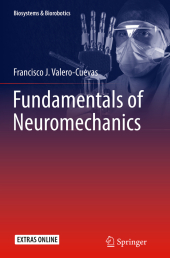 Neuerscheinungen 2016Stand: 2020-02-01 |
Schnellsuche
ISBN/Stichwort/Autor
|
Herderstraße 10
10625 Berlin
Tel.: 030 315 714 16
Fax 030 315 714 14
info@buchspektrum.de |

Francisco J. Valero-Cuevas
Fundamentals of Neuromechanics
Softcover reprint of the original 1st ed. 2015. 2016. xxiv, 194 S. 65 SW-Abb., 3 Tabellen. 235 mm
Verlag/Jahr: SPRINGER, BERLIN; SPRINGER, LONDON; SPRINGER 2016
ISBN: 1-447-17089-X (144717089X)
Neue ISBN: 978-1-447-17089-1 (9781447170891)
Preis und Lieferzeit: Bitte klicken
This book provides a conceptual and computational framework to study how the nervous system exploits the anatomical properties of limbs to produce mechanical function. The study of the neural control of limbs has historically emphasized the use of optimization to find solutions to the muscle redundancy problem. That is, how does the nervous system select a specific muscle coordination pattern when the many muscles of a limb allow for multiple solutions?
I revisit this problem from the emerging perspective of neuromechanics that emphasizes finding and implementing families of feasible solutions, instead of a single and unique optimal solution. Those families of feasible solutions emerge naturally from the interactions among the feasible neural commands, anatomy of the limb, and constraints of the task. Such alternative perspective to the neural control of limb function is not only biologically plausible, but sheds light on the most central tenets and debates in the fields of neural control, robotics, rehabilitation, and brain-body co-evolutionary adaptations. This perspective developed from courses I taught to engineers and life scientists at Cornell University and the University of Southern California, and is made possible by combining fundamental concepts from mechanics, anatomy, mathematics, robotics and neuroscience with advances in the field of computational geometry.
Fundamentals of Neuromechanics is intended for neuroscientists, roboticists, engineers, physicians, evolutionary biologists, athletes, and physical and occupational therapists seeking to advance their understanding of neuromechanics. Therefore, the tone is decidedly pedagogical, engaging, integrative, and practical to make it accessible to people coming from a broad spectrum of disciplines. I attempt to tread the line between making the mathematical exposition accessible to life scientists, and convey the wonder and complexity of neuroscience to engineers and computational scientists. While no one approach can hope to definitively resolve the important questions in these related fields, I hope to provide you with the fundamental background and tools to allow you to contribute to the emerging field of neuromechanics.
Francisco Valero-Cuevas is a Full Professor in the Department of Biomedical Engineering, and the Division of Biokinesiology & Physical Therapy at the University of Southern California. He also holds appointments in the departments of Aerospace & Mechanical Engineering and Computer Science. Prior to this he was Assistant and Associate Professor at Cornell University.
He holds a Bachelor´s degree in Engineering Science from Swarthmore College, a Masters degree from Queen´s University, and a Doctoral degree in Mechanical Engineering focused on neuroscience from Stanford University.
He has been visiting professor at the Max Planck Institute in Munich, Germany, ETH-Zurich, Switzerland, and the Institute of Sports Sciences in Innsbruck, Austria. He has served as Associate Editor of the IEEE Transactions on Biomedical Engineering and Guest Editor of PLoS Computational Biology. In 2013 he was elected Senior Member of the IEEE, and in 2014 to the College of Fellows of the American Institute for Medical and Biological Engineers.
His research focuses on an integrative approach to brain-body interactions for versatile function in machines and organisms.


